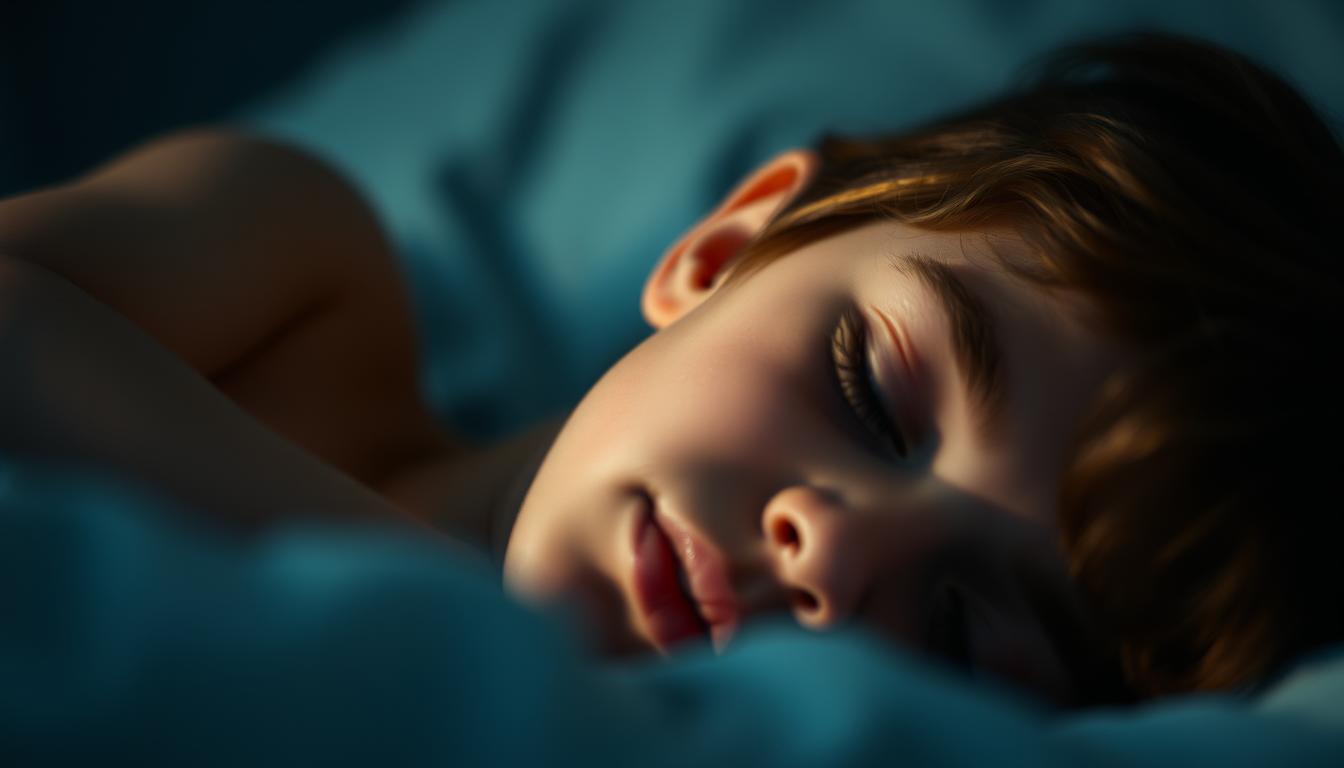Ever wondered why your teenager stays up late but can’t wake up for school? It’s not just about being rebellious or lazy. It’s a natural change in their body’s timing that starts during puberty.
This change is called a “phase delay.” During the teen years, their body clocks shift. This makes them want to go to bed and wake up later.
This shift affects millions of American teens every day. It impacts their school work, mood, and health. Knowing about these changes helps parents and teachers better support teens.
The science behind these sleep pattern shifts is interesting. Your teenager’s brain is changing a lot during this time. This article will look into why these changes happen and offer ways to handle them better.
What is the Adolescent Biological Clock?
Every teenager has a complex biological clock inside them. It controls their sleep-wake patterns and energy levels. This clock is not like a regular watch. It changes a lot during the teenage years.
This biological clock is like a master coordinator for the body. It affects hormone levels, body temperature, and more. During puberty, it starts working on a new schedule.
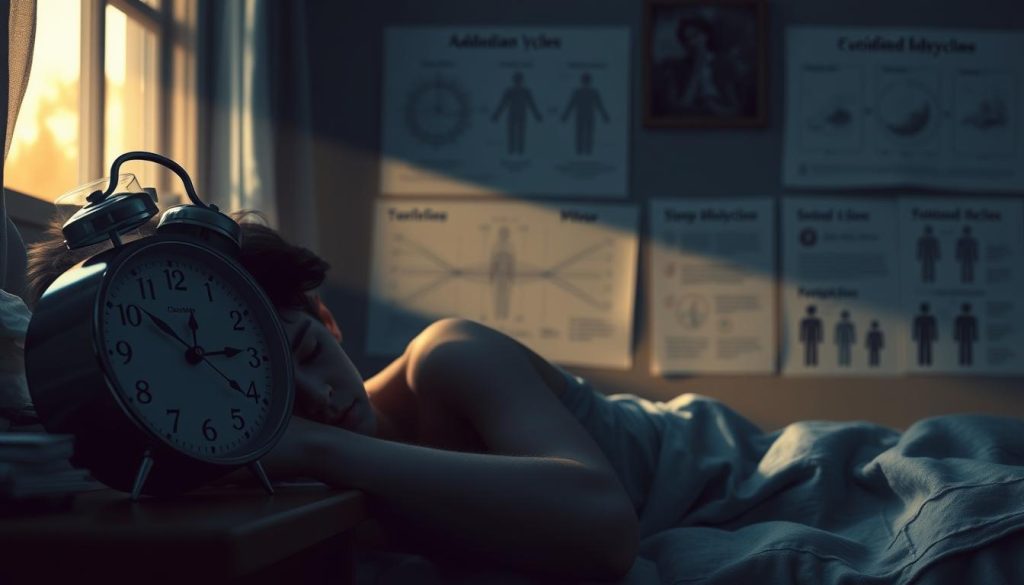
Overview of the Circadian Rhythm
Circadian rhythms are key in teenage biology. They cycle every 24 hours, helping the body adjust to daily changes. The brain’s master clock, the suprachiasmatic nucleus, controls these rhythms.
Light is very important for these rhythms. In the day, the brain makes less melatonin, keeping us awake. At night, melatonin levels go up, telling us it’s time to sleep.
Teenagers need brighter morning light to wake up. They also get tired faster when exposed to evening light, especially from screens.
Key Changes During Adolescence
Adolescence brings big changes to the body’s timing. These changes start around age 13 and last until the late teens. They happen fast, not over years.
One big change is later bedtimes and wake times. Teens feel most awake in the evenings and find mornings hard. This isn’t laziness, but a natural part of growing up.
The teenage brain reacts differently to light and sleep cues than adult brains. Teens need stronger morning light and have trouble falling asleep early. This makes it hard to stick to traditional bedtimes.
These changes help teens develop important skills. Being awake in the evenings lets them learn from friends and bond. This is key for growing up and becoming independent.
Factors Influencing Biological Clock Changes
The way teens sleep changes due to biology and environment. These changes take time as teens grow up. Knowing what affects sleep helps parents and teens manage it better.
Role of Hormones
Hormones like melatonin play a big role in sleep changes in teens. Melatonin tells the brain it’s time to sleep. But in teens, it starts later than in kids and adults.
This delay is why teens often stay up late. Growth hormone patterns also change, affecting sleep. Teens need more sleep for their bodies to grow.
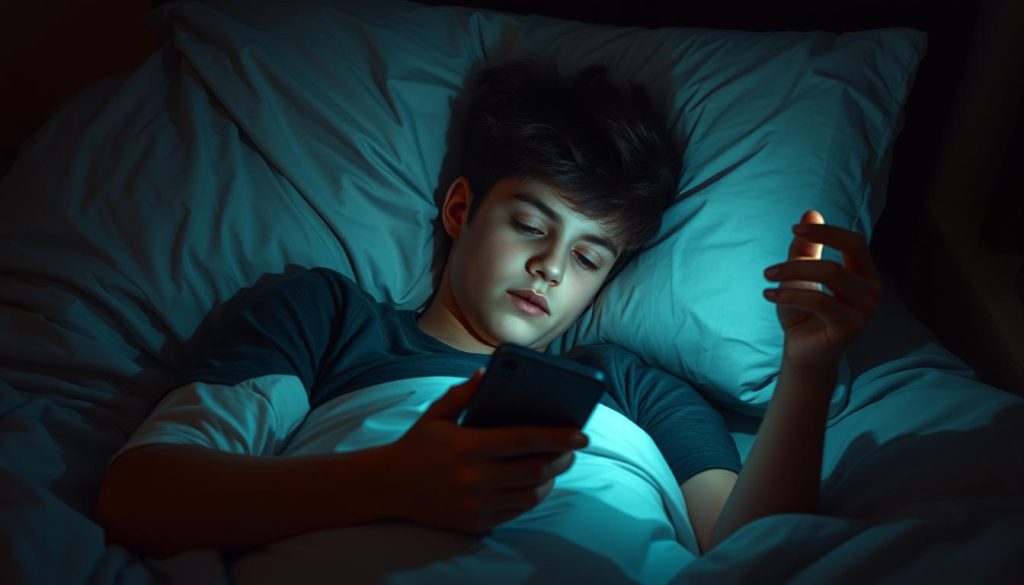
Puberty affects sleep with changing hormones like cortisol, testosterone, and estrogen. These hormones impact when teens feel tired and how well they sleep.
These hormonal shifts make sleep hard for teens. They fight their natural sleep needs when school starts early. Their bodies aren’t ready for sleep at traditional times.
Influence of Technology and Screen Time
Technology is a big challenge for teen sleep. Blue light from screens lowers melatonin levels more in teens than adults. This makes it tough for teens to sleep early.
Social media and games are designed to keep teens awake. They make teens feel alert and delay sleep. Notifications and the fear of missing out keep teens up late.
Teens often get stuck in a cycle of too much screen time. This leads to not enough sleep and feeling tired during the day. They then use screens to stay awake, making the problem worse.
Teens face sleep challenges from their biology and the world around them. They must deal with their changing sleep needs and the pressure of technology.
Impact on Sleep Patterns and Health
When teenage sleep patterns get disrupted, it affects their health in many ways. The changes in their bodies during adolescence make sleep hard to get. This impacts how tired they feel and their overall health.
It’s important for parents and teens to understand why sleep issues during this time are serious. Sleep problems in teens are not just about feeling tired in class.
Sleep Disruption and Daytime Sleepiness
Teens’ melatonin levels play a big role in when they feel sleepy. During adolescence, melatonin production happens later in the evening. This means teens don’t feel tired until much later than others.
The difference between when teens naturally feel sleepy and when school starts is a big problem. Many teens find it hard to stay awake in morning classes. This leads to chronic sleep deprivation.
Daytime sleepiness is a big issue for teens. It affects their schoolwork and memory. They have trouble concentrating and forming memories when they’re tired.
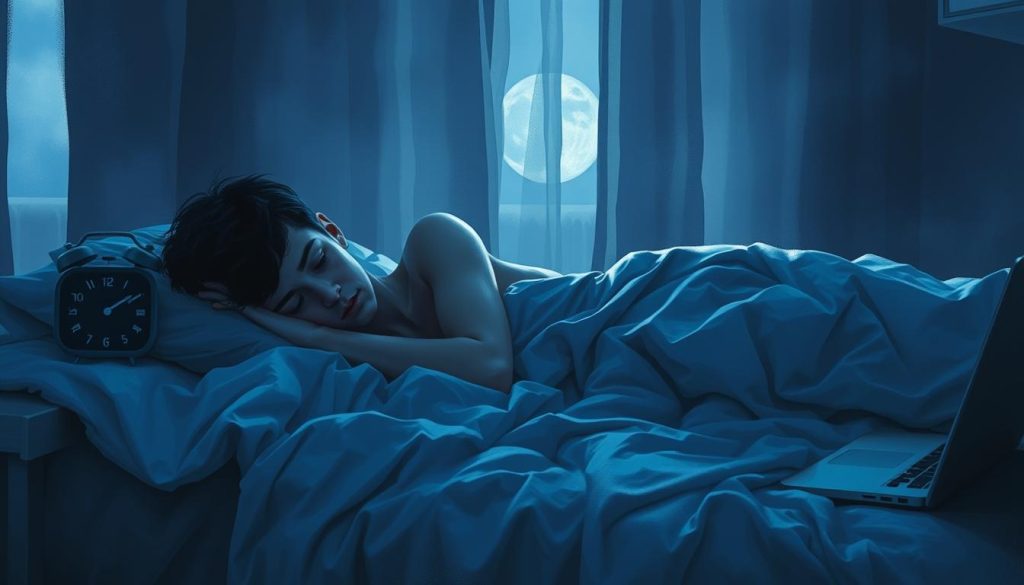
Safety is a major concern when teens are sleep-deprived. They are more likely to have accidents, especially when driving. Their reaction times slow down when they don’t get enough sleep.
Emotional regulation is also affected. Teens can become more irritable and moody. They may also experience more anxiety and depression when they don’t sleep well.
Long-Term Health Implications
Disrupted sleep in teens can have long-term effects. It can affect their health in many ways as they grow older.
Teens who don’t get enough sleep have weaker immune systems. They get sick more easily and take longer to get better. Their bodies need sleep to fight off infections.
Poor sleep can also lead to weight gain and increase the risk of diabetes. The body needs quality sleep to regulate blood sugar and appetite.
Brain development is especially vulnerable during adolescence. Sleep disruptions can harm areas of the brain that control decision-making and emotions. These effects can last into adulthood.
Studies show that poor sleep in teens can lead to mental health issues and substance abuse later on. It can also increase the risk of heart problems. Addressing sleep issues in teens is crucial for their long-term health.
Strategies to Support Healthy Biological Clocks
Managing changes in the adolescent biological clock is key. It’s about creating supportive environments and setting realistic routines. Success comes from working with, not against, natural sleep patterns. This requires patience, flexibility, and understanding from both parents and teens.
Finding a balance between biological needs and daily tasks is crucial. Families can use practical strategies that respect natural rhythms while meeting school and social needs.
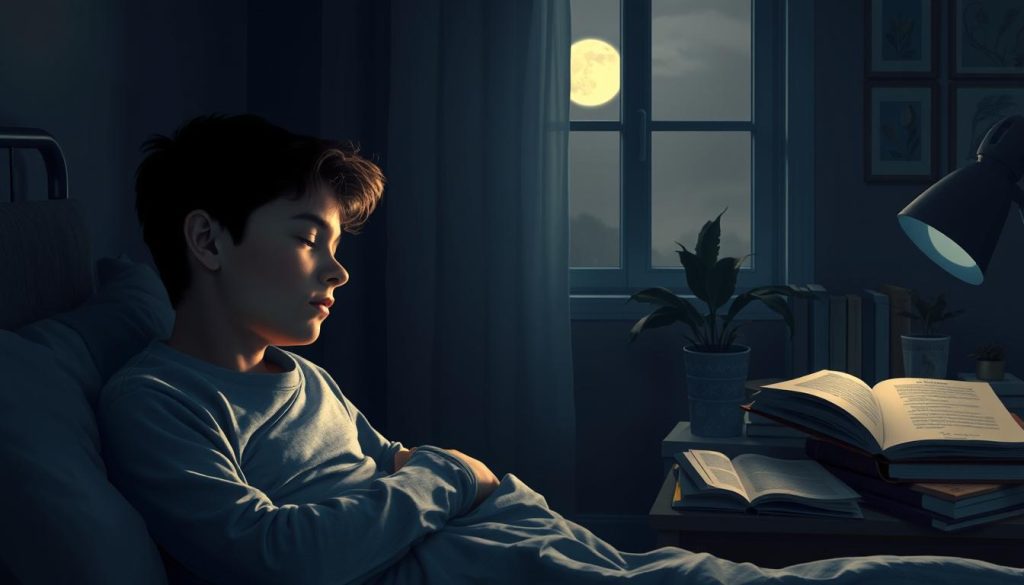
Building Sustainable Sleep Routines
Creating consistent sleep schedules for teens needs a flexible approach. Instead of rigid bedtimes, families can set routines that help shift sleep patterns in a healthier way.
Effective sleep schedule strategies include:
- Maintaining consistent wake times even on weekends to prevent dramatic schedule shifts
- Allowing slightly later bedtimes while keeping wake times stable
- Creating calming bedtime routines that signal the brain to prepare for sleep
- Using bright morning light exposure to help reset the biological clock
- Dimming lights in the evening to support natural melatonin production
The sleep environment is crucial for healthy patterns. Cool, dark, and quiet bedrooms promote better rest. Blackout curtains and comfortable temperatures help create the best conditions for deep sleep.
Smart Technology Management
Effective screen time management doesn’t mean no technology. Instead, families can set boundaries to reduce sleep disruption while keeping devices accessible.
Practical technology management approaches include:
- Implementing device-free bedrooms to create dedicated sleep spaces
- Using blue light filters on screens during evening hours
- Establishing screen curfews 1-2 hours before intended bedtime
- Creating engaging alternative evening activities like reading or puzzles
- Charging devices outside bedrooms overnight
Family involvement makes these strategies more successful. When parents model healthy technology habits, teenagers are more likely to follow. Creating household routines that support everyone’s sleep needs builds consistency.
Education empowers teenagers to make informed decisions about their sleep habits. When teens understand how adolescent biological clock changes affect their bodies, they become active participants in improving their sleep quality. This knowledge helps them recognize the importance of these strategies for their overall health and academic performance.
Seeking Help: When to Consult a Professional
Many sleep issues in teens can be handled at home. But, some cases need expert advice. Knowing when to seek help is key.
Warning Signs That Need Attention
Some signs show sleep problems are more than just teen stuff. If your teen can’t sleep before 2 AM, it’s a red flag. Also, if they can’t wake up and miss school often, it’s a big concern.
Daytime sleepiness that won’t go away is another warning. Sleep patterns that don’t follow day and night cycles need a doctor’s check. Mood swings, school problems, or staying away from friends might also mean there’s a health issue.
Available Resources and Support
Pediatric sleep specialists can figure out what’s wrong. They might find issues like delayed sleep phase syndrome. Sleep centers have programs for teens with sleep rhythm problems.
Mental health experts can check if anxiety or depression is causing sleep issues. The National Sleep Foundation has helpful resources. Many places have support groups for parents to share tips and advice.
Getting help early can stop long-term problems. It helps teens grow up healthy and strong.

